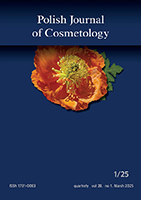search by
Copyright @ Pol J CosmetolA comperative study about the skin hydrating effect of Vernix caseosaM. Sedef Erdal, Ahmet Araman Istanbul University, Faculty of Pharmacy, Dept. of Pharmaceutical Technology, 34116 ISTANBUL, TURKEY Summary Introduction. In preterm delivery, the absence of Vernix caseosa (VC) on skin surface results in a much higher risk for infectious diseases and a poor temperature control of the newborn. For this reason preterm infants are often covered with barrier creams to avoid transepidermal water loss (TEWL). These barrier creams differ in some important aspects from that of the VC. Aim. The aim of this study was to develop W/O/W type multiple emulsion formulations mimicking VC more closely with respect to its water content and skin hydration capacity. Material and Methods. W/O/W type multiple emulsion formulations, including cholesterol and squalene in the oily phase have been developed. The effect of these formulations and VC on normal and on acetone induced dry skin was evaluated as influence on hydration with a Corneometer. ATR-FTIR was employed to investigate the biophysical changes in the Stratum corneum (SC) lipids after treatment with formulations and VC under non occlusive conditions. Results. The positive impact of VC and multiple emulsion formulations on normal and damaged human skin has been determined with panel tests. Formulation F4 simulated VC more closely with respect to its hydration effect and 80% water content. Conclusion. As a conclusion, multiple emulsion formulation F4 can be considered as a suitable preparation that may be used as an alternative to improve the protection of preterm infants after birth by absence of VC and by treatment of diseased dry skin in adults, which often parallels an impaired barrier function. Key words: vernix, skin hydration, multiple emulsion, ATR-FTIR Spectroscopy |




